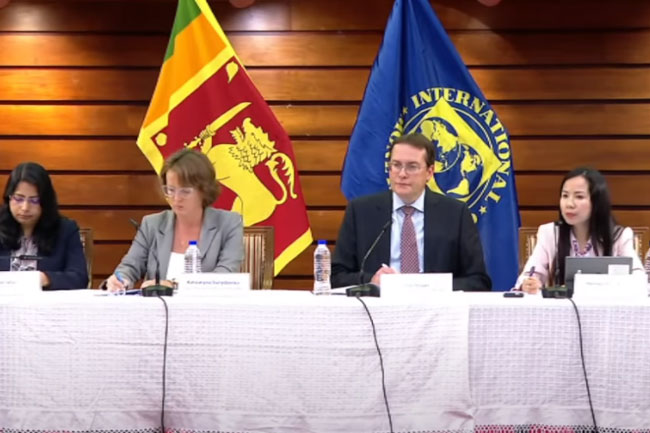September 27, 2023,
COLOMBO — Crisis-hit Sri Lanka suffered another setback on Wednesday, after it failed to clinch a staff-level agreement on the next stage of its bailout from the International Monetary Fund, which did not give a timeline for disbursing a second $330 million aid tranche.
In its first official review since agreeing to the $2.9 billion assistance package in March, the IMF said that while there were encouraging signs of stabilization in Sri Lanka, a full economic recovery was not yet in sight.
“The people of Sri Lanka have shown remarkable resilience and the authorities have made significant progress on important reforms,” the IMF said in a statement at the conclusion of a two-week visit. “Discussions will continue towards reaching a staff-level agreement in the near term that will maintain the reform momentum needed to allow Sri Lanka to emerge from its deep economic crisis.”
Peter Breuer, the IMF’s senior mission chief for Sri Lanka, told media that the release of the second tranche will depend on whether the government could sustain reforms and make progress on paying down debt.
The IMF expects revenue mobilization gains to fall short of initial projections by nearly 15% this year and wants the government to find ways to boost its coffers. “To increase revenues and signal better governance, it is important to strengthen tax administration, remove tax exemptions, and actively eliminate tax evasion,” Breuer said in the statement.
Dhananath Fernando, CEO of Sri Lanka-based economic policy think tank Advocata, agreed that Sri Lanka needed to streamline and improve its taxation system by following international standards of transparency.
“If we stick to those principles, we can achieve the revenue targets,” Fernando said. “Also, tax holidays provided on a selective basis based on political affiliations need to be reversed to improve the tax revenue. When a tax system is simple, stable and neutral, many people fall into the tax base.”
Chayu Damsinghe, head of macroeconomic risk advisory at Colombo-based Frontier Research, also said that Sri Lanka needed taxation reforms.
“It’s worth noting that such reforms may take a year or two to yield results, but they are a crucial part of the solution,” he said. “Additionally, even Sri Lanka’s middle class must acknowledge that sustaining their consumption and lifestyle requires a fair contribution through taxes.”
But critics of the IMF said that taxes alone will not be enough and that the body should have enforced cost-cutting measures on the government to begin with.
“Had the policy program been designed as a blended approach at the origin, both IMF and the government would not have faced this embarrassing situation,” said W. A. Wijewardena, a former central bank deputy governor. “Since curtailing expenditure will not take place, the IMF expects the government to increase taxes further. It seems that the professionals who went before the IMF team for relief have been given a harsh treatment.”
Colombo-based economist Talal Rafi said the main issue was Sri Lanka’s external debt. “The government has made progress with new laws and gains on important fronts like primary balance targets. The elephant in the room is the external debt restructuring. Hopefully, President Ranil Wickremesinghe’s visit to China can make progress on this,” he said.
Wickremesinghe is expected to visit China in October and to encourage more investments in Sri Lanka.
Rafi added that the IMF setback may even be a positive development for Sri Lanka, as it will force the government to work harder on structural reforms, including in the state-owned enterprises sector and governance-related matters. “As elections approach next year, it is easy for the government to turn more populist,” he said.
The IMF did point to some positive developments in its statement — inflation has come down to below 2% in September from a peak of 70% a year ago, while gross international reserves increased by $1.5 billion during the March to June period, and shortages of essentials have eased.
Much of the public remains sceptical of the country’s direction. A survey by Verite Research revealed that around 45% of Sri Lankans believe the IMF’s bailout package will make things worse in the future, while only 28% were of the opinion that the ongoing program will lead to a better outcome for Sri Lanka’s economy.(NIKKEI Asia)





